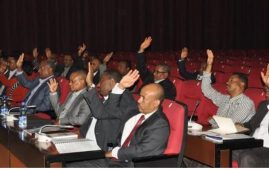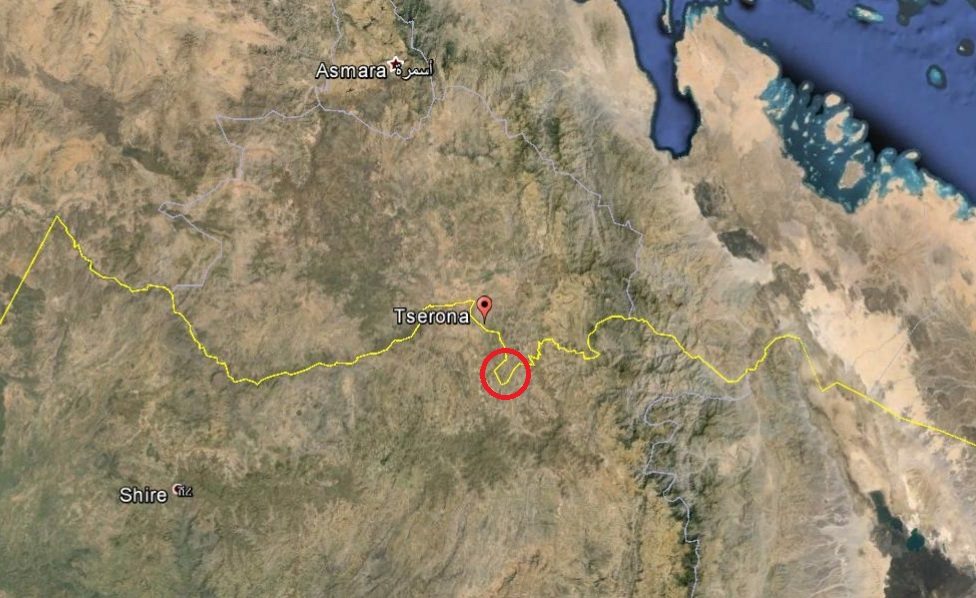Eritrea’s Foreign Minister, Osman Saleh, and special political advisor to the President, Yemane Ghebreab, visited the UK Foreign and Commonwealth Office for the first time last week at the invitation of the UK Government. Analysts in the UK described the visit as a possible shift in UK policy.
Eritrea is currently under UN sanctions for its role in destabilization in the Horn of Africa, its support for Al-Shabaab and for its refusal to respond to UN Security Council resolutions 1844 and 1907. Yemane Ghebreab, of course, was described as an “extraordinary threat” to US national security in a presidential order signed by President Obama in April 2010.
The Eritrean officials met with the UK’s Minister of State for Africa, Henry Bellingham, and other senior officials of the Foreign and Commonwealth Office, and with the Secretary of State for International Development, Andrew Mitchell. A range of bilateral and regional issues were discussed including regional security and stability, and migration and piracy. Mr. Bellingham underlined the importance that the UK attaches to improvements to human rights including religious and press freedom in Eritrea and the case of the G-11 ministers and officials arrested in September 2001 and held incommunicado without charge or trial ever since. Several are believed to have died in detention.
Last month, Eritrea was ranked last for the fifth year running in the Reporters Without Borders press freedom index with at least 34 journalists in prison, including some held in solitary confinement since September 2001. A number of rights groups including Reporters Without Borders have continued to campaign for them.
Those detained include the Swedish journalist, Dawit Isaac the subject of a Habeas Corpus petition sent to the Supreme Court in Asmara in July 2011 requesting Dawit’s immediate appearance in court under Eritrea’s constitutional and criminal code provisions and international obligations. Eritrea, of course, does not have a constitution. The court has so far refused to acknowledge receipt of the petition.
Efforts were also made in the UK by the London-based human rights NGO, Redress, by Reporters Without Borders and by the Eritrean human rights campaigner, Elsa Chyrum, to bring Naizghi Kiflu, a former head of security and information minister at the time of the September 2001 crackdown, to trial for his responsibility for torture of detainees. Naizghi, subsequently an adviser to President Isaias, died in the UK on February 6th after a long illness.
*****************
Source: A Week in the Horn – Feb. 17, 2012 issue.
Check the Eritrea archive or the Eritrean terrorism archive for related posts.






DAWIT ISAAC is a criminal who deserves to be in prison. The Eritrean government has the right to imprison those citizens who intentionally disturb the national psyche. Elsa Chyrum please stop inadvertedly/advertedly AIDING THE WEST to make us defeat our national objectives. What is the human right’s record of the US or Europe for that matter, have they not been embroiled in slavery for the last five hundred years? Are they still not highly involved in slavery today, thanks to the likes of you? You may say the words HUMAN RIGHTS a thousand times over but you willl never convince me that the devil is not in you or that you YOURSELF ARE NOT A HUMAN-TRAFFICKER! Look at the case of GHEZAE HAGOS, an outright liar and a traitor and yet these are the kind of CRIMINALS that the West INTENTIONALLY uses in its ENDLESS AND UNJUST SUBJUGATION OF AFRICA AND AFRICANS! Elsa Chyrum, the more of us you help them to kill and sell, the more prizes, awards and recognition The West will give you. PRESIDENT ISSAIAS AFEWERKI IS THE BELOVED AND CHOSEN LEADER OF HIS PEOPLE, it is you we hate Elsa Chyrum. You will never divide us, you will never succeed in your racist and self-hating ploy to wipe out your own people’s NOBLE AND PROUD CAUSE! The birth of the NEW AFRICAN HAS LONG BEEN AT HAND, it is traitors like yourself who shall hopefully die out. AWET N’HAFASH!